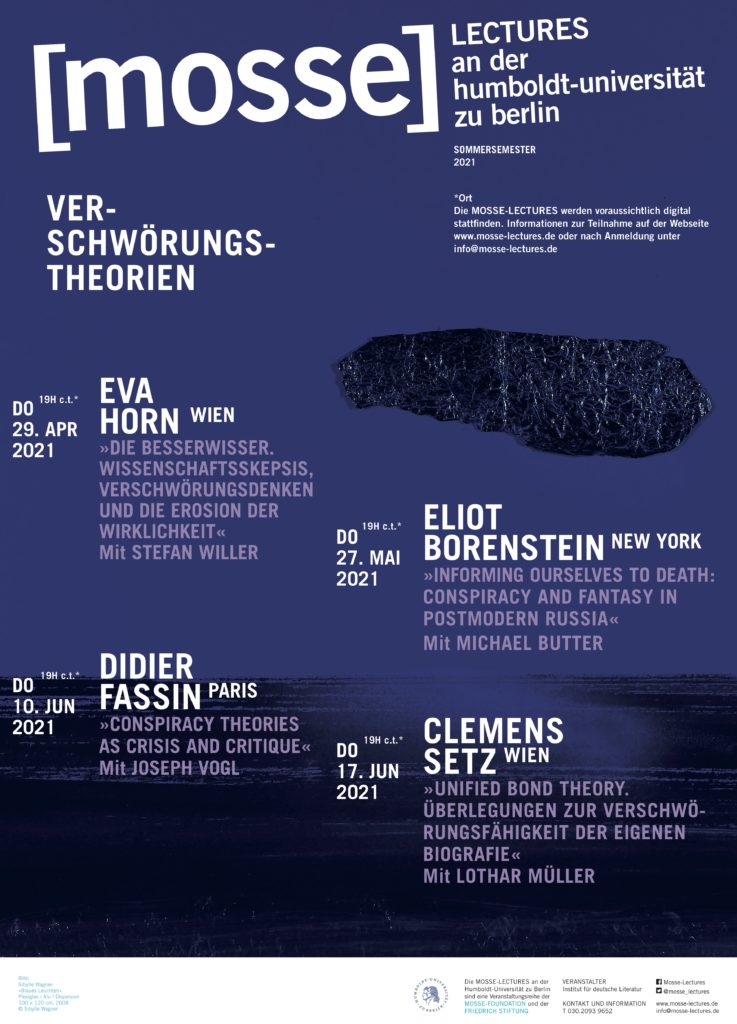Summer Semester 2021

In times of uncertainty and looming threats changes, conspiracy theories have become extremely popular again, in life stories as well as in political propaganda. In times of crisis and catastrophe an urgent need to reduce complexities to simple meanings gains attention, thus producing psychotic and collective dynamics by projecting personal fears and privations onto unknown forces and secret powers. Conspirative thinking and feel-ing transforms causalities and contingencies into an asserted coherence. Conspirative discourse thus invents its own logic, careless of facts and consistent in itself, fascinating for many as an amalgamate of well-known elements of experience and knowledge abruptly brought together: a creative and inspirational panoply of phantasies, presump-tions and suspicions, facts and fiction. Emotionally charged with an uncertain feeling of one’s own real or suggested inferiority, a hostile superior force is imagined, which acts mysteriously and is in total control. An evil empire appears in manifold shapes: the subversive energy of secret societies, the Jewish or communist world conspiracy, the economic phantasm of the invisible hand of the market, and all kinds of conspirative strategies of agents and systems. Since theories of conspiracy draw their potential of identification from real or presumably real activities and happenings they are part of innumerable every day social and political conflicts and conflict managements, including even scientific research and technical solutions. Ultimately, of course, the agenda of conspiracy theory might become conspirative itself. Faced with the rise of a »paranoid style« of conspiracy, which is gaining the upper hand in internet fake news and cyberspace activities in national and world politics, this series of Mosse-Lectures intends to take a second look at the power and impact of conspiracy theories both in history and in our own time. We focus on the fictional conspirative plots of Umberto Eco, Thomas Pynchon, and other recent narratives, on an analysis und critique of populist strategies and the complicity of information politics and media entertainment, on the political effects of conspiracy theories in post-Soviet Russia and the Arabic world, and, last but not least, on the psychiatric evidence of the conspirative syndrome itself in everyday life and in public relations.
Eva Horn
»Die Besserwisser. Wissenschaftsskepsis, Verschwörungsdenken und die Erosion der Wirklichkeit«
29.04.2021 | 7.15 pm | Lecture via live-stream on our YouTube-channel
With Stefan Willer
Eliot Borenstein
»Informing Ourselves to Death: Conspiracy and Fantasy in Postmodern Russia«
Respondent: Michael Butter
Introduction and Talk: Ethel Matala de Mazza
27.05.2021 | 7.15 pm | Lecture via live-stream on our YouTube-channel
Didier Fassin
»Conspiracy Theories As Crises and Critique«
With Joseph Vogl
10.06.2021 | 7.15 pm | Lecture via live-stream on our YouTube-channel
Clemens Setz
»Unified Bond Theory. Überlegungen zur Verschwörungsfähigkeit der eigenen Biografie«
With Lothar Müller
17.06.2021 | 7.15 pm | Lecture via live-stream on our YouTube-channel

